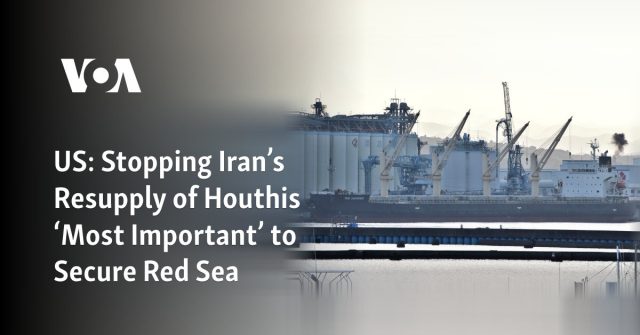As attacks by Iran-backed Houthis continue in the Red Sea, the commander in charge of U.S. military operations in the Middle East says the U.S. needs to stop Iran from providing the militants with weapons.
“The most important thing is to deny their ability to resupply from Iran. The Houthis are not building. They’re putting it all together and assembling, but they don’t create inertial navigation systems. They don’t create medium-range ballistic missile engines,” Gen. Erik Kurilla, the chief of U.S. Central Command (CENTCOM), told members of the Senate Armed Services Committee on Thursday.
The U.S. and British militaries have launched multiple combined operations against weapons facilities, radars and launch sites in Houthi-controlled areas of Yemen. The U.S. has also continued near-daily strikes to take out weapons that were prepared to launch and shoot down incoming Houthi weapons, including strikes late Wednesday against two Houthi drones.
An anti-ship ballistic missile launched earlier Wednesday from Houthi-controlled territory in Yemen killed three crew members of the Barbados-flagged, Liberian-owned bulk carrier True Confidence in the Gulf of Aden, CENTCOM said in a statement. It was the first fatal strike by Iran-backed Houthi militants since the onslaught on international shipping lanes began in mid-November.
More than a dozen commercial ships have been impacted by Houthi drones or missiles during that time. Those vessels have included an aid ship with grain bound for Yemen and at least one ship with cargo bound for Iran. One vessel carrying fertilizer, the MV Rubymar, sank over the weekend after is was damaged in a Houthi attack last month.
On Tuesday, the Houthis targeted the U.S. Navy destroyer USS Carney, which shot down bomb-carrying drones and one anti-ship ballistic missile, according to CENTCOM.
Some senators on Wednesday expressed a desire for more forceful action against Iran, the Houthis’ supplier of weapons, funding and intelligence needed to attack vessels.
“Why are we not sinking those Iranian ships if there’s an Iranian spy ship providing targeting information,” asked Republican Sen. Dan Sullivan of Alaska.
Gen. Kurilla said that deterring Iran requires a “whole of government” effort.
Last month, the United States carried out a cyberattack against two Iranian military ships. A U.S. official who spoke to VOA on condition of anonymity to discuss covert operations said the Iranian spy ship MV Behshad was one of the targeted ships. It had been collecting intelligence on vessels in the Red Sea and the Gulf of Aden.
The Houthis have said their attacks against international shipping lanes are carried out in solidarity with Hamas.
Hamas terrorists launched a brutal attack that killed hundreds of Israelis on October 7. Israel responded with an operation to root out Hamas in the Gaza Strip, an ongoing operation that has killed thousands.
Close calls
Shortly after the attack, Iranian proxies in Iraq and Syria began a series of attacks against U.S. forces in the region. After more than 170 attacks that left dozens of service members injured, the militants flew a drone into Tower 22 air base in Jordan, killing three American service members and injuring dozens more.
Kurilla revealed on Thursday that U.S. forces had “several” close calls before the deadly Tower 22 attack, and that he had balanced the U.S. response options that he provided to the president against escalating the conflict.
Asked by Senator Roger Wicker, the ranking member on the Senate Armed Services Committee, whether the militias in Iraq and Syria could have killed U.S. troops prior to the deaths in Jordan with “a little bit of extra luck,” Kurilla replied, “That is correct.”
“There were several incidents where UAVs (unidentified aerial vehicles) coming into a base hit another object, got caught up in netting, or other incidents where had they hit the appropriate target that they were targeting, it would have injured or killed service members,” he said.
VOA previously reported on one of these incidents that occurred in late October. A drone crashed into a barracks housing U.S. services members but failed to detonate, likely saving several lives, according to defense officials.
Threat from Afghanistan
As a result of the attacks on U.S. service members in the region and international shipping lanes, Kurilla said that the U.S. has had to divert intelligence and reconnaissance assets from Afghanistan to Iraq, Syria and Yemen.
He warned that the risk of an attack by violent extremists in Afghanistan on American and Western interests abroad is increasing, saying that Islamic State-Khorasan Province affiliates in Afghanistan and Syria “retain the capability and will to attack U.S. and Western interests abroad in as little as six months and with little to no warning.”
The general said such an attack would be more likely in Europe, as it would take “substantially more resources” to hit the U.S. at home.
U.N. correspondent Margaret Besheer contributed to this report.






















